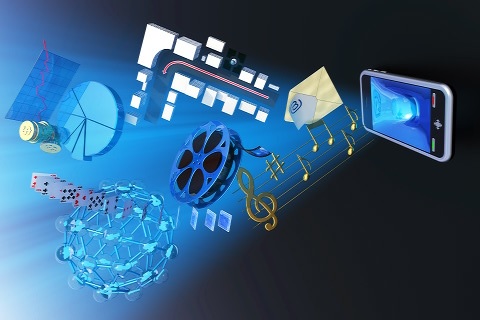 newsitems
newsitems
newsitems
EU chair Swedish Minister to EuroFora on Barroso : Not affected by Lisbon Treaty +Czech 2010 delay
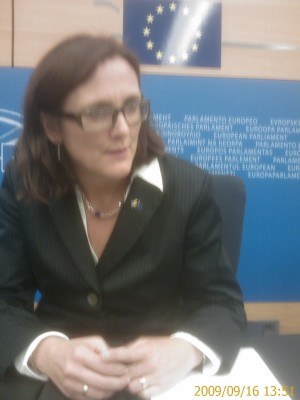
Barroso's re-election under Nice Treaty should not be affected by the ratification of Lisbon Treaty, which may even be delayed by Czechs until June 2010, said Swedish Minister Cecilia Malmstrom, EU Chairwoman-in-office, replying to "EuroFora"'s and other Journalists' questions et EU Parliament in Strasbourg, immediately after EU Commission President's controversial but clear vote. (See specific "EuroFora"'s publication).
But a risky scenario is that, "even if Irish vote "Yes" on Lisbon Treaty, Czech delays to ratify may push for an EU Commission on "Nice" Treaty (without 2nd vote on Barroso), until UK holds a referendum against the new EU institutions after May 2010 brittish elections...
Swedish EU Presidency (7-12/2009), which notoriously supported Barroso from the start, believes that there shouldn't be any need to re-vote anew, after the ratification of the Lisbon Treaty, on the new President of EU Commission, in a new institutional landscape :
- "Barroso already got an absolute majority today", replied to "EuroFora"'s question Cecilia Malmstrom. Moreover, after Czech elections were postponed for November, it seems that some Czech senators plan to anew attack the Lisbon Treaty to the Constitutional Court at Brno. "This might prolonge the ratification process as far as ..June 2010", she speculated.
Malmstrom, speaking to "EuroFora", strongly supported the view that, even if 2007 Lisbon Treaty is ratified, there is no need for a new vote on Barroso, who has just received an EU Parliament's vote under 2000 Nice Treaty procedure, contrary to what some other legal interpretatiions claim :
- "This is not necessary. Absolutely not : This is not provided for by the Treaty, and Mr. Barroso got Lisbon majority. So, the Parliament will have to asess every individual Commissioner, as always, first in a written procedure and afterwards in hearings, and then, it will make a Collective decision : That will include of course Mr. Barroso, but it concerns the whole (EU) Commission. So, there is no need to re-confirm Mr. Barroso's" apointment.
On Barroso, the Swedish EU Minister said that, in her view, "there is nothing which obliges Barroso to be re-elected, after Lisbon Treaty's expected entry into force : I know that EU Parliament (Legal services) has said so, but nobody else asked that". Nothing excludes to elect a President under Nice treaty and the whole Commission under Lisbon treaty. I know that EU Parliament (Legal services) have said so, but we asked other Experts and nobody else said that"., she added.
On the contrary, EU Parliament's former Chairman of the Constitutional committee, German Socialist MEP Jo Leinen, recently stressed in Strasbourg the fact that the conclusion of an EP's Legal Study was that "a new election" of new EU Commission's Presidents should take place, inside a new institutional context, if Lisbon Treaty is ratified and enters into force.
- "Mr. Barroso appeared to say that, at any case, he needs Time, because of Pittsburg (Financial) and Copenhagen (Climate summits), and so on, while Lisbon Treaty will take time, and he didn't look to be very much eager" to go fast, observed another Journalist to Malmstrom.
- "It's very good that he's busy", replied the Swedish Minister. "Because people expect from Europe to provide results on Economy, jobs, Climate, etc. All those Institutional issues are, naturally, important, but the most important is that EU works, and this we shall do also with the Commission",
- "I don't think that this might be discussed over diner, Tomorrow (i.e. Thursday : during Brussels' mini-Summit), because the Swedish EU Presidency has first to make sure that all EU Member Countries agree on the Economic Crisis and Climate proposals, so that we can speak on behalf of all the EU. Of course we shall welcome Mr. Barroso's re-election, but we aren't going to discuss now the new Commission : It's useless", she added.
----------------------
- "The Plan "B" is Nice Treaty !"
------------------------
As for Lisbon Treaty : - "It depends on what happens in Ireland : Even if the Irish vote "No", we need a Commission. If they vote "No", we have to appoint a Nice (Treaty) Commission. Because we need a Commission ", the Swedish Minister added in her reply to "EuroFora".
- The "ideal scenario is, if the Irish vote "Yes", and all others ratify, then, on early October to have a Dialogue with Member States in view of a decision on the whole ("Lisbon") package in October, considering that on 29 and 30 October we have a Heads of State and Government Summit : I.e. on who will be EU Council's Secretary General, its permanent President, the (Foreign affairs) EU Representative, and on the List of Commissioners, which will have to be afterwards endorsed by the (EU) Parliament", she said.
- "If the Irish vote "NO", then we shall now that there will be no Lisbon Treaty. So, the (Swedish) Prime Minister will immediately consult all Member States in order to see how we can appoint a Commission under Nice Treaty". Because "there is no Plan "B" : the Plan "B" is Nice (Treaty) !"
Questioned by Journalits if she's "worried by the situation in Czech Republic", Malmstrom replied that "even if it's not yet clear, I think that the Elections will, now, be held on June" 2010, instead of November 2009, contrary to what was initially expected.
But "I don't think that this might influence the problem they have with the (Czech) President (Vaclav Havel), who would not yet ratify, and with the process that some Senators try to do in order to send all Lisbon Treaty to the Constitutional Court" at Brno. "And, for that, there is no Time Deadline in the Czech Constitution. So, we don't know where all that will end"..
- "If they drag heir feet, and we don't know any date, f.ex. at the end of 2009, or at the beginning of 2010, if we don't have a Date, then, we (EU) should decide, at some point, that we need a Commission, and, therefore, we shall appoint a Commission under Nice Treaty : Even if the Irish may have, meanwhile, voted "Yes"" to Lisbon Treaty, she observed.
- "But other Capitals say that, if we don't have Lisbon (Treaty), then it's better to reduce Commission's size for one third (-33%), in order to be efficient. So it's not obvious at all".
- "A possible scenario", then, is to eventually nominate for EU's Foreign Policy Representative someone from the countries who will not have an EU Commissioner", Malmstrom replied to another Journalists' question on Belgium's MEP, former PM, Verhofstadt, new Chairman of EU Parliament's Liberal Group : An initially stubborn opponent of Barroso, who later made an U-turn accepting his re-election.
Meanwhile, questioned by Journalists in Strasbourg if he was "worried by the latest turn taken by Polls in the forthcoming Irish Referendum on EU Treaty, Barroso did not deny that there is "a Risk" : - "It's for the Irish citzens to decide.. I think that Lisbon Treaty is good for Ireland and Europe. Now, if there are risks, and risks might be, I like to take risks for something we believe in". "I think that (the Irish Referendum) will be won, but, at any case we are ready to act., added Barroso.
As for President of EU Parliament's Socialist Group, German MEP Martin Schultz's criticism that his re-election would have a "weak" base because he was voted also by "Anti-Europeans" as the Brittish Conservatives, Czechs, Polish and other EU-critical MEPs' new Group, Barroso replied that - "My program is a very ambitious European program. I don't choose those who vote for me. F.ex. some of them are against the Lisbon Treaty, but I am for the Lisbon Treaty".
In fact, few important common points are known between Barroso and Brittish MEPs, except for Turkey's controversial EU bid, (who notoriously has to pass a crucial EU check on its commitments on December 2009), free Trade, relations to America, etc.
EU Parliament's President, Buzek, to "EuroFora": - "EU needs New ways to interact with Citizens !"
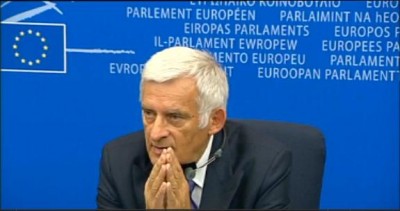
EU "needs New ways" to interact with its Citizens, by "innovation" and open, interesting debates on main issues, with "Vision", "Values" and "Solidarity", replied new EU Parliament's President, Polish ChristianDemocrat/EPP MEP Jerzy Buzek, to "EuroFora"s question in the Press Conference he gave in Strasbourg after his inspired, inaugural Speech on the Priorities for the next 3 Years 2009-2011, during which he aims to revive the "European Dream".
This need was acknowledged later by EU Commission's re-elected President, Jose Barroso, but was stronger stressed by the Chairman of the largest Group of MEPs : ChristianDemocrats/EPP, French MEP Joseph Daul, who welcomed Buzek' statements to "EuroFora", adding that EU Parliament must be "prepared" to fullfil its "Mission in the coming 5 Years : .. to bring our Citizens closer to Europe".
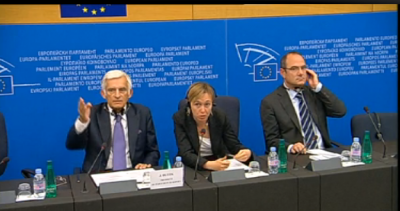
- " Mr President, you spoke very well about "Vision", and "Solidarity" in Europe, etc, but also about Practical Measures, and you highlighted, in particular your will to bring EU closer to Citizens, including by New Technologies, that you already started to use for Commissions etc. Do you think that the possibility for Citizens, not only to know what their MEPs said in EU Parliament, but also to participate in Publc Debates on EU Parliament decisions, thanks to new technologies, might be useful, if it's done in a wise and innovative way ?", "EuroFora" asked Buzek.
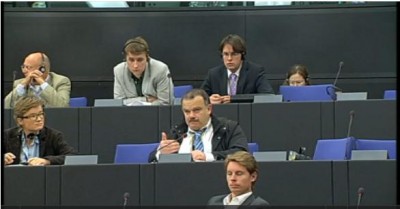
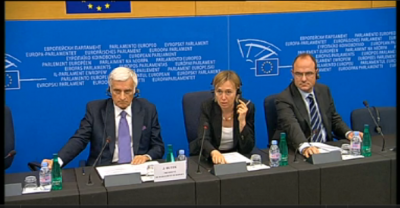
- "You are right, this is correct", EU Parliament's President replied to "EuroFora"'s question. - "We (EU) also need new ways of staying in touch with our citizens". "I believe that this will be extremely important", during the next "5 Years" (2009-2014), and "it will impove, in my view, also the Electoral turnout", he observed, after the 1999-2004 Majority Abstention trend, was almost stopped, but not yet reversed in June 2009.
- But "we are in a Crisis, and we need to be Innovative" : "I spoke about the state of the art (new) Technologies because we neerd them in order to overcome the (double) Crisis" : Both in Economy and in "our Citizens' trust", as he had said earlier. Thus, f.ex. "we have already introduced Internet streaming on the discussions of EU Parliament Commissions : There will be on-line transmissions of the Debates of 12 EP Committees", so that "our citizens, both in Europe, and those abroad, will be able to follow these discussions". In fact, "tt's today that we really need the idea of "Lisbon strategy" (on Innovation-driven Society), which seems to be slightly forgotten", added Buzek, who was also EU Parliament's Rapporteur on the current Science, Research and Technology framework program (2009-2014).
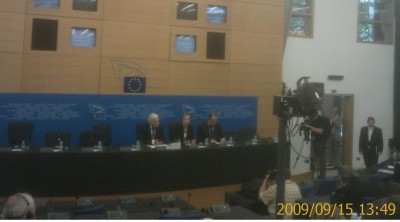
Meanwhile, EU "Parliament's reform", boosted by the expected entry into force of "Lisbon Treaty", will aim "to promote a true European Demos", promissed Buzek, in relation with "EuroFora"s question (See supra) : "To bring the European Citizens closer to EU Institutions", "we should also look at the way that EU Elections are organized : Citizens should know for whom they are voting for, not only in their own Country, but also vis-a-vis the entire EU too, he added
- "It's true that there is a Problem to solve", on EU's distance vis a vis Citizens, acknowledged later also the re-elected EU Commission's President, Jose Barroso, on the job since 2004, speaking to Journalists in Strasbourg, including "EuroFora".
- "If the European Parliament has a role to play and a mission to accomplish in the coming 5 years, it is to bring our Citizens closer to Europe", stressed shortly afterwards, welcoming Buzek's statements to "EuroFora", the President of EU Parliament's largest Group : ChristianDemocrats/EPP, French MEP Joseph Daul.
- "We must prepare ourselves politically. "Our objective is clear: that the Parliament be more in line with the 500 million Citizens it represents", he added
- "What better asset to have in this mission than a President (Buzek) symbolic of the reunited Europe which embodies openness and respect for the opinions and origins of others, and not intolerance and exclusion ? I want the European Parliament to share these Values.", Daul concluded.
- "Vision" for Europe, "Solidarity" which makes us all feel inside "our, United Europe", with "Ambition" and "Innovation", together with "Human Rights' Values", at the "Democratic Heart" of Europe : EU Parliament, resolved to make People "dream" of Europe and their dreams become true : These are some examples of Buzek speech's vocabulary.
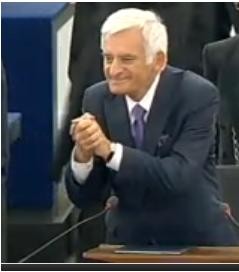
- "Words can work Miracles, and words can lead to facts", replied Buzek to a Polish lady journalist close to "EuroFora" who had asked him if he was just a "symbol" of EU Unity while, in fact, some wanted to reduce cohesion and agricultural funds soon."There are very deep divisions in the EU", he acknowledged in reply, concerning EU's need to boost its Cohesion policy in order to become a more integrated area and boost EU Citizens' common feelings of belonging to "one Europe, our Europe". A challenge on which, even IMF"s Experts had already warned, from the point of view of Economic development and performance at a medium-long term, on the sidelines of European Central Bank's 10th Anniversary Summit, as early as since 2007, at nearby Frankfurt...
Buzek's ambition is to bridge in Future 2 Gaps of the recent Past : Between EU institutions and Citizens, as well as between Western and Eastern EU Member States, while also overcoming the current Economic Crisis, and preparing to tackle the issue of Energy security of suppies, Climate Change, etc.
Reviving the "European Dream" for EU Citizens goes hand by hand with the "Dream for the Unity of our Continent", that the very election of the Polish politician and Scientist moved by Moral Values symbolizes : "There is no longer an 'old and new Europe'. This is our common Europe", Buzek stressed.
But, marking also the continuity of EU's History, Buzek invited all living former EU Parliament's Presidents : German Christian Democrats/EPP Egon Klepsch and Hans Gert Poettering, as well as Socialist Klaus Hansch, Spanish Socialists Baron Crespo and Josep Borrell, as well as ChristianDemocrat/EPP Gil Robles, French EPP Nicole Fontaine , Irish Liberal Pat Cox, etc.; with whom "EuroFora" worked together during more than 18 Years at the European Press sector.
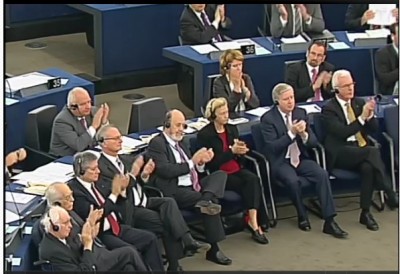
In the short term, EU Parliament will mainly have to prepare Institutional changes if Lisbon Treaty is ratified by all, and Europe's stance in the World Summits against the Economic Crisis and on Climate, at Copenhagen, December 2009.
But Buzek will stay in office at least until December 1011, i.e. also during the forthcoming Polish EU Council presidency, (July - December 2011).
This should give him enough Time to complete the struggle against the Crisis and the return to Growth, while also preparing Security of Energy supplies, and a "Green Revolution", as he said. But also to sefeguard "Cohesion policy.. in the New Financial Perspectives, if we want to achieve the full Integration of our reunited continent", since "without Solidarity, there is no true European Community". As well as to meet the "challenge of Human Rights and Values", on whose "respect" the "EU is based", both internally and at its "Foreign Policy", where "we need more Europe at a Global stage", to "continue working on Enlargement" in order to "bring closer to the EU" key-countries, develop strategic "Partnerships","promote Democracy and Good Governance", and "strengthen the European Security and Defence policy".
EU Health Commissioner Vassiliou to EuroFora on Virus AH1N1 Vaccine : Safety is the most important !
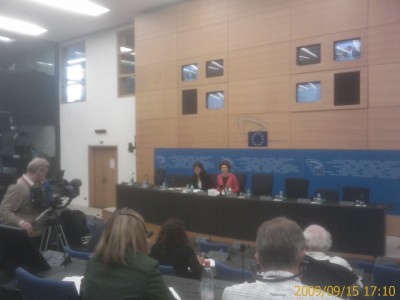

Even if the sole body in charge of controling the vaccines is the London-based European Medicine Agency (EMA), which works on a virus' strain given by the only official American Labo, nevertheless, Strasbourg-based European "Pharmacopeia", a CoE's body, already intervned from the start, with preventive controls on the Virus' specimens affected to EMA, and will also inervene before mass distribution to ensure that the produced Vaccines will meet the standards, said to "EuroFora" EU Expet Antoon Di Santo.
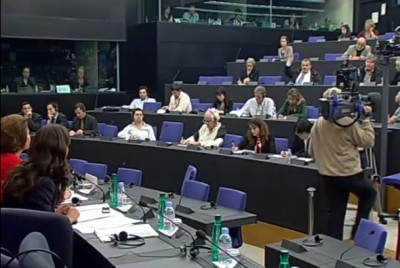
- "Safety of Vaccines is the most important issue for us", replied EU Commissioner Vassiliou to "EuroFors"'s question. "So, when vaccines will be certified by the (EU) Comission, we shall be absolutely certain", she promissed. EU has enough Experts at its disposal in order to be able to ensure that, she added.
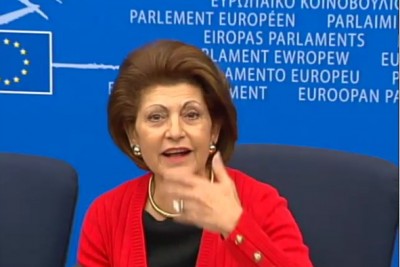
The move is expected to start "before the end of September". Meanwhile, EU Commission already anounced a series of practical measures from now in order to help several EU Member Countries (particularly among the "new", Central-Eastern European States) who don't seem to have enough means to cope alone, to get access to sufficient vaccines in the best possible conditions, thanks to "joint procurements", EU "coordination", etc. As well as in order to focus, at first, on the most exposed parts of the population, (such as Health and other essential public services' agents, pregnant women and children, people with relevant chronic diseases (such as cardio-vascular, diabetes, respiratory, etc), before enough vaccines for all will be produced later-on.
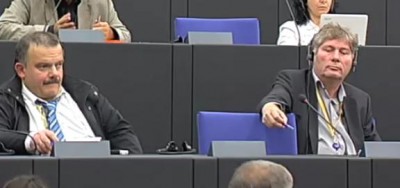
But Vassiliou is aware of a risk for the A H1N1 Virus to "mutate" into a different genetic mix during winter time. - "I hope this doesn't arrive", she said, because things will become much more difficult. It's already a genetic mutation, provoked by unknown causes, which seems to be at the origin of "new" Virus A H1N1 : A "mix" of swine and avian virus with human virus, similar to that of "Spanish Flu" which reportedly killed millions on the sidelines of the 1st World War,
This might explain why the 2009 Pandemics, which progressively stroke all the World, started "at the spot" of such an incident, (i.e. at US Borders between California and/or Texas and Mexico), said to "EuroFora" EU Expert Di Santo, who works at the same EU service which was also in charge of the fight against SARS epidemics in the recent past, which had notoriously originated at a Hong-Kong Labo.
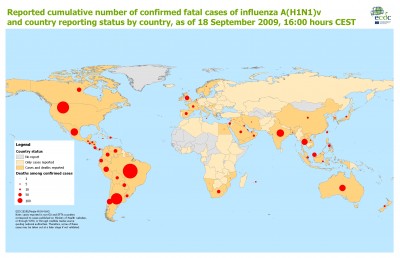
- In fact, all flu viruses frequently mutate, more or less : That's why often vaccines are updated to such changes, he observed. But he waqs unable yet to explain why a kind of virus who had disappeared since the "Spanish Flu" at the beginning of the 20th Century, suddenly re-appeared in 2009 in a mutated version..
( See EU Commission's preparatory measures in detail at : http://ec.europa.eu/avservices/player/streaming.cfm?type=ebs&sid=147317)
F. CoE Chairman welcomes Sarkozy's proposal to create a common area between EU and Russia
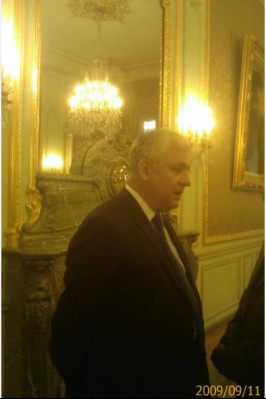
New Russian Ambassador to France, Alexander Orlov, who had recently the Historic experience of chairing the CoE during the 1st Russian presidency (2007), speaking to "EuroFora", warmly welcomed Nicolas Sarkozy's recent proposal (2009) to create a common area between EU and Russia, (that the French President wanted also to include Turkey and other neighbouring countries), but strongly criticized the harassment by some other lobbies against Russia which also hinders the panEuropean CoE to realize iits potential :
- "Sarkozy fixed a target that Russia shares with him", stressed from the outset Orlov.
I.e. "to create, between EU and Russia a common Economic and Human area". "While for the "Economy", several things have already been said, on the contrary : "Human" is also very important", because it can facilitate Contacts between persons, Visas, (fex. for students, experts, businesmen, politicians, athlets, artists, etc), and "naturally Scientific and Technologic exchanges", etc.,"making of Europe a Common Home", he observed.
- "Despite of what some erroneously claim against Russia, we are united by the same Humanitarian Values which originate from the Century of Enlightenement, when Catherine the great had close contacts with Voltaire, Diderot, etc, in order to understand that the roots of this community of destiny between EU and Russia has a long History", Orlov added,
Orlov spoke to "EuroFora" at a splendid classified Paris' monument, the "Hotel d'Estrée", ordered by the Duc d'Estrées during the 18th Century to brillant Architect Robert de Cotte, famous even accross Germany, which had become the Home of Russian Ambassadors in Paris since the 19th century, and was recently restorated, during the 2007 Russian CoE presidency, by Artistic Experts from Saint Petersburg's famous "Hermitage" museum.
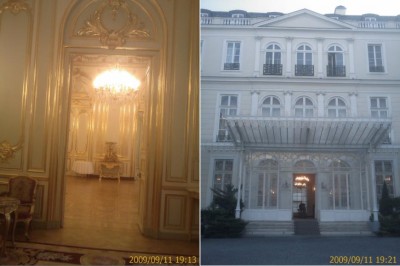
Significantly, the move came at the eve of an exceptional visit to Moscow by French Prime Minister Francois Fillon, to meet Russian Prime Minister Vladimir Putin, next Monday, to prepare a Franco-Russian inter-Governemental conference around November 2009 in Paris and a crossed "France-Russia" 2010 Year to be organized at the same period by both countries reciprocally.
-----------------------------------------------------
Meanwhile, Orlov had organized a reception for participants to CoE's Paris Conference on the "Future of Human Rights" and of the PanEuropean Organization, which discussed also he new Report of the Head of France's Delegation to the CoE, MEP Jean-Claude Mignon, on CoE's Future, (See relevant "EuroFora"s publication), at the Russian Ambassador family's residence, the famous "Hotel d'Estrée", at Grenelle street, close to the also famous Hotel Matignon, of Prime Minister Fillon.
- "We (Russia) always believe in CoE ! First of all, because it's the only PanEuropean organization, which gathers together all European countries, and focuses on important issues, such as Democracy, Human Rights and Rule of Law"; "We think that CoE could greatly contribute to build Europe's Unity, around common Values", Orlov told on this occasion "EuroFora".
- "But, what we regret inside CoE, is that, instead of making a great policy, some limit it only in petty politics, and keep a permanent climat of confrontation, in which it's difficult to see anything positive", he denounced. "And this climate of confrontation paralyses CoE : precisely, this confrontational climate, this absolutely useless "war", hinders CoE from doing anything constructive, because it wastes its Time in this absurd conflict"...
- "Instead of living always in the Past, trying to find sceletons in the cupboard, we'd better all turn towards the Future. "We want to always respect Human Rights, but some are making a bad process against Russia", he added.However, "an organization (as CoE) has a Future if it is looking towards the Future" :
- "F.ex, "CoE being an organization which has a great deal to do with Law, it could work for the harmonisation of national legislations, to create a common Legal area in Europe". "It's certain that there are some European Countries which are not immediately due to become EU members, F.ex. "Russia is too big, has other priorities, and is auto-sufficient : it doesn't need to integrate the EU. "But if, thanks to CoE, we can harmonise our Legislations, this will create a common Legal area, this will greatly facilitate Economic, Humanitarian and Political exchanges between the two parts of Europe" ""There are still many things to do", in this direction, the experienced Orlov proposed.
- "But, for that purpose, EU should recognize CoE, which has a larger representativity than the EU, a primary right to elaborate some fundamental rules". "Because what happens now, is that the EU adopts Directives, that it tries, afterwards, to impose upon all other CoE non-EU members"; "It happens almost everywhere : in Politics, etc, and it makes it more and more difficult for the CoE to elaborate new Conventions. Because, EU Law hinders CoE's members to elaborate new common rules : "This is a very important question of principle", he noted.
+ Lukin denounces attempts to push Russia backwards, and asks more understanding by the CoE
-------------------------------------
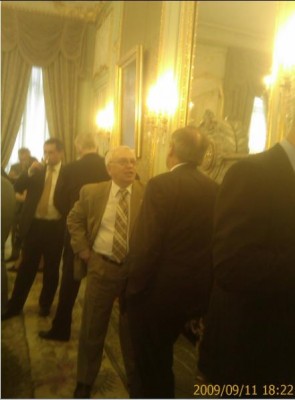
- "The problems do exist : some people in Russia believe that CoE is too much pro-Western", started to say the frank-speaking Lukin.
- But we would like from the CoE to better "take into account the real Aspirations, the "real Necessities, the real problems of such Countries as Russia, which are to some extend third world counttries of Europe, and have problems in making socio-economic, political and legal progress, step by step, with special attention to Stability", he stressed.
- "Russia is very important for the EU, and EU is very important for Russia, but we feel that their is a trend to "use" Russia, and try to push it to return backwards", he denounced
On the contrary, "we would like some more Equal distance (i.e. less Double Standards : comp. relevant "Eurofora" publication), more attention, and understanding to our special stage of development", Lukin advised.
- Because "now, we (Russia) are in a situation, where either we make progress, including on Economic and Social issues, or, there will be very negative consequences, like some social upheavals, which may return Russia to go backwards", he warned.
- "And this Government (i.e. of President Medvedev and Prime Minister Putin), would like to maintain some Democratic achievements, perhaps not full, but most of them, as Freedom of Press, Expression, Freedom of Travel, etc, But not, at the same time, produce a situation of Chaos, as it was in Russia before, and is now in Ukraine"
- "We are pressed to go that way !"; But, "of course, Kremlin resists, and some increase their pressure to make our regime less democratic", Lukin denouinced.
CoE opens Debate on post-9/11 realpolitics needing Human Rights to revitalize Europe
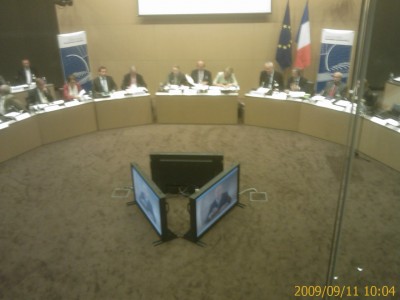
At a crucial juncture for "CoE's Future", after "60 years of experience", "Double Standards" must stop", stressed to "Eurofora" CoE's Rapporteur, Head of France's Delegation, ChristianDemocrat MEP Jean-Claude Mignon ; -"My main message is that CoE must now turn towards the Future, modernize the organization, ..and stop dispersing our energy on various areas, without forgetting that our 1st mission is to defend Human Rights and Democracy". "EU has a differend mission : It's mainly an Economic organization, while our (CoE's) Values are about Human rights and Democracy".
- That's why, "Leaders of several CoE Member states must undestand that all ECHR's Judgements must be applied, without any exception : It's not up to us to judge, afterwards, if some judgements should be implemented, and others not", he added. As for "genuine Real-Politics", "it's not true that they are always opposed : In fact, intelligent Real-Politics in Europe should be combined with the use of Human Rights, Mignon concluded.
In the post-9/11 era, a pan-European Debate on Human Rights values would meet Europe 's vital need to boost Citizens' support, and can be more efficient even for "Real-Politic" aims, than anti-democratic and impopular, excessive and sometimes immoral oppressive measures, said in substance a PanEuropean Conference on the "Future of Human Rights and Democracy in Europe", opened by CoE's acting Secretary General Mrs Maud de Boer-Buquicchio and Mignon in Paris.
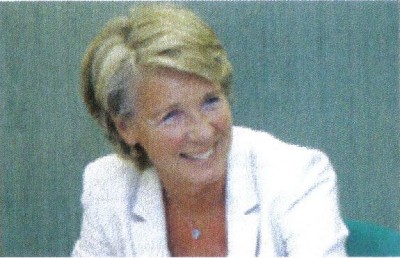
Speaking on the Anniversary of the same Day that World Trade Center faced brutal deadly attacks and destruction at New York, back in 2001, the experienced "MBB", (who personally celebrated also in 2009 30 years of work at CoE's Human Rights sector since 1979), started by reminding that, after some 3.000 innocent people were killed "in one of the most massive and atrocious terrorist attacks in History", "there is the time before, and after 9/11... on our perception of Human Rights".
Some of "post-September 11 approaches ...regarded Human Rights as a Nuisance and an Obstacle in the fight against Terrorism", she observed. While, on the conrtary, "respect for Human Rights .. is not only compatible with a robust response to the terrorist threat, but is actually indispensable for the success of anti-terrorist policies in the long run", MBB stressed.
- "The 1st option...lead to responses which blatantly violated Human Rights", with a "Hard-line, Guantanamo-like approach", which "was not only morally wrong, but also practically ineffective". This "swept aside many of the Fundamental Principles of a Society respecting Human Rights and the Rule of Law", and "left ..traces", which ...may reappear every time a new Crisis challenges our commitments, ...our proclaimed Values and Legally binding standards, which have served as a foundation for Stability in Europe", she denounced.
While we must "look into some of these dilemmas - how and wheher to protect Human Rights and Democracy when we face a Security or Economic threat", in fact, "as to the CoE, ...that dilemma ...does not exist"; Because "for us, Human Righs ..are not a luxury affordable only in times of Stability and Peace", but "necessary to protect Society as a whole, and to fight against threats to its Stability", MBB concluded.
-------------------------------------------
- "In fact, experience shows that, at the end of the day, Human Rights are more efficient, also from an Economic point of view, than Totalitarian Regimes", stressed from the outset former CoE's Secretary General, Catherine Lalumiere, current Director of "Europe's Home" foundation in Paris, refusing the opposition described by some people between Human Righs and Real-Politics"
Unfortunately, some "forgot the fact that the very meaning of the European project was initially to create a model for Human Rights' respect", by establishing the CoE, while Economic issues, even if important, came only afterwards, when EU was established. Thus, an extreme "Materialism", which followed after that, "is one of the causes of the profound desillusion that EU Citizens feel" recently. But now, that we face a "New Context", with the galoping "Globalisation" and the recent "Crisis", "Europe needs to find anew its Identity", and to "modernise its Human Rights' values project", which is "a Social and Moral choice", she concluded.-
----------------------------------------
- "Initially, the European construction was driven by an aspiration for Peace" (with the establishment of CoE, in 1949). Later-on was added also a strive for Economic Prosperity (with the creation of what became recently the EU), reminded former President of Portugal, Jorge Branco de Sampajo, in a special video-message to Paris' CoE conference.
- "But now, in order to avoid regressing, Europe needs a supplement of Soul", able "to win back EU Citizens' lost confiance" : This means to "reinforce real respect for Human Rights' values, and to develop Citizenship and Participative Democracy"; "Europe is strong if Human Rights are respected. But Europe is weak if there are obstacles to Democracy and Human Rights' values", he stressed.
---------------------------------------------------
- "EU managed to fill up the floors of Europe's building, but it forgot its Foundations !", denounced Alvaro Gil Robles, former CoE Human Rights' Commissioner, and current Director of research in Valsain Foundation for Democracy in Spain. While now, Europe doesn't need "more protocols" and bureaucracy, but "to fight for the Essentials", he stressed.
That's why, Gil Robles proposed "for CoE to launch a pan-European Debate, at a global stage, on where we are on Human Rights : are they respected, or not ?".
Lalumiere welcomed Gil-Robles' "idea", and added that such pan-European Debates should focus on the strength that we want to give to the essentals of Human Rights, as part of Europe's identity. rRobles' proposal was also endorsed by CoE Conference's official conclusions, which end by anouncing the possibility to prepare "a Wide Debate... on fundamental Values, their relevance and implementation in current European Society".
Speaking to "EuroFora", Gil Robles agreed that such a pan-European Debate should "actively involve also the European Civil Society", i.e. NGOs, journalists, experts, and interested Citizens.
CoE's acting SG, Maud de Boer - Buquicchio, had anounced from the outset that she was "looking forward to the Debate", where she "expect(s) a Vigorous and Critical exchange of Arguments between People who have a lot to say about Human Rights - and are not afraid to say it".
But, for the moment, unfortunately, someone had the bad idea to exceptionally isolate Journalists covering CoE's conference from the other Participants, by placing them at ..another Floor, where we were not even seen by -and could not see ourselves- a CoE's "moderator" who vainly asked us to "joint the debate"... one floor underneath, while we were practically hindered even to show her our willingness to speak in public, until it became too late !
In despair, CoE's last moderator, after some vain calls, tried at least to show a part of a Video she had taken with some "EuroFora"'s observations on Europe's present need to urgently solve crucial problems which challenge the efficiency of its Human Rights' protection mechanism, (See relevant "EuroFora" publication on that point). But she was apparently hindered even to show any image, so that she limited herself merely into playing only an Audio transcript of part of our observations, without even showing who made them....
Thus, the floor was, unfortunately taken mainly by a too long series of claims, by some British MEPs, on so-called "discriminations" against... "Gay and Lesbian pride parades", "Heterosexuals", etc, leaving aside the most tragic violations of core-Human Rights, such as Torture, Killings, "Disappearances", condemnation to Prison sentences, destruction of family homes, etc.
Moreover, numerous attacks against only Russia, taking pretext from various incidents, (even against an erroneous presentation of late ArchiBishop Alexi II's statements at the CoE in Strasbourg), were observed, while, on the contrary, nobody even spoke about any among the numerous grave Violations of Human Rights for which ECHR has notoriously condemned Turkey .. A point which obviously made very glad the Head of the Turkish delegation to CoE's Assembly, MEP Cavusoglou, who was not used to this surprising and exceptional absence of any critocism...
Such unavoidable impressions of "Double Standards" were already denounced, earlier in Strasbourg, by Human Rights Watch's Director for Europe and Asia, Mrs Holly Cartner, in reply to an "EuroFora" question, even at a higher level inside CoE :
- "..My understanding is that the (CoE's) Committee of Ministers is being clearly more forceful on the Tchechnyan judgements (against Russia) than it was in judgements on Turkey !", criticized Cartner, in reply to a question on "double standards". "So we need to do a lot more work in terms of Pressure ...on the Institution (CoE's Committee of Ministers), to make sure that it's not the case...", she concluded.
Cartner said that in reply to our observation that, while Turkey still persists to fail to do any efficient investigation on the brutal murder of Turkish Cypriot dissident Journalist ADALI, in the Occupied Territories of Cyprus, contrary to Ukrania, which has condemned 2 persons and recently arrested a 3rd for the brutal murder of dissident Journalist GONGADZE, CoE's Ministers have mainly criticized ..Ukraine's insufficient enquiry to find and punish those who ordered the murder, but didn't yet say anything on Turkey's total failure, despite the fact that on both these cases of dissident Journalists' murders (Adali and Gongadze) ECHR issued judgements condemning Turkey and Ukraine at the same year : 2005.
- "The question is what use is made of the Judgements of the European Court", said on the same issue, of ADALI and GONGADZE's cases CoE's Rapporteur on the protection of Human Rights Defenders, German mainstream MEP Holger Haibach, of the ChristianDemocrate/EPP Group, speaking earlier to "EuroFora".- "All of us must try to treat all cases equally" : "If there is a Judgement, and it says that there is a breach of Human Rights, then, we (CoE) have to follow it, irrespective of the country or the region". "But, if I look at what gets in (CoE's Committee of Ministers) and what gets out, ..it has been Political skid !".. , he criticized. - "So, the question is to find a way to raise Public Awareness", concluded Haibach.
+ ""Russia is usually admitting that there are some problems to settle, and says that it tries to deal with them, f.ex. by searching to finding and/or prosecute some of those responsible for possible abuses in Tchechnya, while, on the contrary, Turkey mainly claims that all this concerns "terrorists" and/or that it has nothing more to do, etc", revealed to "EuroFora" an experienced Diplomat at the CoE. Including even on the ADALI murder case, where Ankara still claims that there was nothing more for her to do in order to find and punish those responsible..
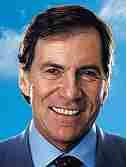
- "One key, highly sensitive issue question concerns a potentially very dangerous, worrying trend that has been evident for some time now..., namely a .. "Politicisation" of issues of ...fundamental Values, to their detriment. Some people even call this "Double Standards" or a lack of courage and political will... these criticisms cannot be ignored and must be discussed' stresses the landmark Report on "CoE's Future" drafted by the Head of the French Delegation, ChristianDemocrat/EPP MEP Jean-Claude Mignon, and unanimously welcomed by CoE's Political affairs committee on Thursday in Paris, as former Prime Minister of Portugal, MEP Joao Mote Amaral confirmed to "Eurofora";
In this regard, "the Execution of the Court's Judgments", is '"cause for Concern", adds Mignon's Report, referring to MEP '"Pourgourides (who) is monitoring the situation", and will update CoE's Committee on Legal Affairs and Human Rights on Friday. - "Deficiencies in the execution of ...the judgements of the (panEuropean) Court" is one of the "difficulties" where resides the panEuropean "Court's real problem", Mignon denounces, citting a new "Report ..prepared by (Dutch MEP, Marie-Louise) Bemelmans-Videc on "Guaranteeing the authority and effectiveness of the European Convention on Human Rights".
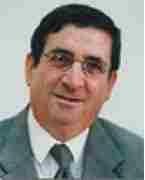
Meanwhile, CoE Assembly's vice-President, and Chairman of CoE's Human Rights sub-Committee, MEP Christos Pourgourides, presented, debated with MEPs and issued his 2009 draft Report on ECHR Judgement's execution, Friday in Paris, revealing the extend to which some CoE member States fail to implement ECHR's rulings even "more than 5 years after their delivery", "raising important ...issues" :
Turkey comes 1st among 47 CoE's Member States, with more than ...42 (!) such pending issues, including also on Hundreds of condemnations for exceptionally Grave Human Rights Violations, such as Torture and inhuman/degrading treatments, killings, "Missing" persons, Destruction of Family Homes, arbitrary deprivation of Liberty (imprisonment), oppression of Freedom of Speech, usurpation of Refugees' homes and land, etc.
Russia comes 2nd with 19, (less than half of Turkey's 42 "issues" !), Romania and Bulgaria with 16, Italy with 14, the UK and Greece with 13, Poland and Moldova with 12, Ukraine with 10, (etc), most of them comparatively less grave.
- Fillon: Digital Economy=big EU Democratic+Human potential=>Nathalie's 2012 WWW baby eyes e-Democracy
- PanEuropean moves for Environment favor Carbon Tax decisions to start
- Sarkozy-Rasmussen:Strong EU role in NATO and Afghanization of conflict as Turkey vetoes EU-NATO deal
- Sarkozy (after Christofia's visit): Turkey must recognize Cyprus if it wants a closer EU link
Main Menu
Home Press Deontology/Ethics 2009 Innovation Year EU endorses EuroFora's idea Multi-Lingual FORUM Subscribers/Donors FAQs Advanced search EuroFora supports Seabird newsitems In Brief European Headquarters' MAPs CoE Journalists Protection PlatformBRIEF NEWS
- 00:00 - 02.06.2021
- 00:00 - 18.10.2020
- 00:00 - 19.06.2020
- 00:00 - 18.05.2020
- 00:00 - 20.04.2020
- 00:00 - 02.02.2020
- 00:00 - 09.12.2019
- 00:00 - 27.11.2019
- 00:00 - 16.11.2019
Popular
- Yes, we could have prevented Ferguson riots says World Democracy Forum's Young American NGO to ERFRA
- Spanish People Elect CenterRIGHT Majority with 1st Party and Total of 178 MPs (6 More than the Left)
- Pflimlin's vision
- The European Athletic "Dream Team", after Barcelona 2010 Sport Championship Results
- Source Conseil d'Europe à ERFRA: Debatre Liberté d'Opposants à Loi livrant Mariage+Enfants à Homos ?
- Head of BioEthics InterGroup, MEP Peter Liese : "Embryonic stem cell research reaching its END" !?
- Spain: Jailed Turkish Terror suspect with Explosive,Drones,Chechen accomplices stirs Merah+ Burgas ?
- UN Head Ban Ki Moon at CoE World Democracy Forum : - "Listen to the People !"
Latest News
- Test Photos (f.ex.+ Invit to EU + Korea Peace meeting)
- EUOmbudsmen Conference 2022: Digital Gaps affect People's Trust threaten EF Project on EU Future ?
- French Election : Black Out on Virus, but Obligation for Fake 'Vaccines" Challenged
- Both French Presidential Candidates point at "Humanism" in crucial times...
- France : Zemmour = Outsider may become Game Changer in Presidential + Parliamentary Elections 2022
Statistics
Visitors: 62257129Archive
Login Form
Other Menu
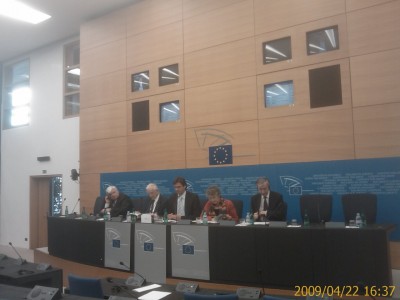
An "Eugenic" loophole Amendment, which might expose to Dangers reminiscent of "3rd Reich's" notorious Genetic Abuses, hidden at the last minute inside an otherwise Good, larger Health policy Package scheduled to be voted on Thursday, was strongly denounced by a coalition of MEPs from various Political Groups and Countries, in a Press Conference held this afternoon at EU Parliament in Strasbourg.
Mainly calling to "Select Human Embryos", via "Genetic Counselling" and "pre-implantation" Techniques including "Genetic Tests", in order to "Eradicate Hereditary rare Diseases", it might open ways to Dangerous Practices in Future, they denounced in substance.
But they also made it clear that a much larger Report inside which this Controversial Amendment "No 15" was added in dubious circumstances, officialy destinated to struggle against "Rare Diseases", and drafted by Professor Antonios Trakatellis, was otherwise "an Excellent Report", aiming at a "completely Uncontroversial target" of Health policy on which "all MEPs and Experts are united, believing that Europe should act" to protect People's Health (See "EuroFora"'s earlier News).
The controversy came at a particularly delicate moment for the EU in relation to Citizens, at the eve of June 2009 EU Elections, and shortly before Ireland re-votes for "Lisbon Treaty"..
- Denouncing risks of "an Eugenic demand, very similar to what we had during the 3rd Reich in Germany, but now coming from some Scientisists themselves", German ChristianDemocrat/EPP MEP Dr. Peter Liese stressed that critical MEPs were against "Eugenic" engineering with "Selection of Human Embryos", and anything which might ultimately lead up to to a "Selection of Human Race". It doesn't help to "eradicate" Human Lives, he added.
Several Experts and NGOs expressed "Deep Concern", as f;ex. DR M.C. Cornel of the "European Society of Human Genetics", which stressed, on this occasion, that "the importance of Non-Directiveness in Reproductive issues is a Central characteristic of Human Genetics, after the Atrocities committed in the name of Genetics in the first half or the 20th Century".
- "This is completely Unacceptable", stressed Italian Liberal MEP Vittorio Prodi, on the Controversial Amendment, also because pushes to "eliminate early Human Life", as he noted.
- "This opens a Dangerous Road, rather a Motorway", denounced Danish MEP Mrs Margrette Auken, from the "Greens", observing that various similar attempts were made in the Past "not only in Germany, but also in several other Countries, "even at the 1970ies", "f.ex. on forced Sterilisation of Roma" People, and other criticisable situations f.ex. in the UK, in Sweden, etc. as she said.
+ Other NGOs, as f.ex. "LebenHilfe" from Berlin, added that, among various other Risks, could also be that, by exploiting the pre-implantation Genetic Diagnostics and the Selection of "healthy" Embryos, some may "propagate" several "Eugenic" aims, starting f.ex. by pushing to eradicate Human Livies which might "Cost too much" to preserve, ultimately exposing to dangers reminiscent of the "3rd Reich"'s atrocious abuses.
In consequence, ChristianDemocrats/EPP and "Green" MEPs "decided by Majority to vote against" this Controversial Amendment, anounced to Journalists the 5 MEPs who participated in the Press Conference, representing a wide spectrum, from Liberals to "Greens" and ChristianDemocrats, and from Hungary, Italy, Germany and Danemark up to Ireland (Gay Mitchell), etc.
----------------------------------
Hungarian ChristianDemocrat MEP Laszlo Surjan said "that it was "Suddenly, at the End of the Procedure" in Committee, that "appeared this (Controversial) Amendment, which has nothing to do" with the main purpose of the Report, on which all agreed.
He denounced an "Unhonest" move, and called to "avoid this kind of unacceptable situations". Nobody should "Select People", Surjan stressed.
- "We (MEPs) had No Chance to Discuss" this last-minute Amendment earlier added at a Committee's level, said German MEP Peter Liese
Speaking to "EuroFora", Dr. Liese, the Spokesman of the ChristianDemocrat/EPP Group in EU Parliament, said that MEPs didn't oppose other references of the Report f.ex. on "Genetic Tests", because they were "no proposals" to impose them, while, on the contrary, there was "a Problem" if anyone attempted to "impose" f.ex. this or that Genetic Technique and "Genetic Counselling", etc. to the People on human reproduction.
-------------
The precise Text :
-----------------
Controversial parts of Amendment No 15 ask mainly "to lead finally to the Eradication" of "Hereditary" "rare diseases", "through Genetic Counselling .., and ..pre-Implantation Selection of healthy Embryos".
But EU Rapporteur Professor Trakatellis, said to "EuroFora" that fears should be alleviated by Guarantees that all this should be done only "where appropriate", when it's "not contrary to existing National Law", and "always on a Voluntary basis", according to other Parts of the Amendment.
He stressed that the main aim was to allow "a free and informed choice of persons involved", without imposing them anything : - "It's not an obligatory, but advisary" text, he said.
To make that point clear, he was ready, in agreement with many MEPs, to eventually drop at least that part of the controversial Amendment which initially called for "efforts to ..lead finally to the Eradication of those rare diseases" "which are Hereditary".
But, until late Wednesday evening, reportedly together with many other MEPs, he stood by all the rest of the controversial Amendment, (fex. on the "Genetic Counselling" and the "pre-implantation Selection of healthy Embryos"), so that critical MEPs, going from ChristianDemocrats as Dr. Liese, to "Greens" or "Ind/Dem", observed to "EuroFora" that "this was not enough" to close the dangerous loophole.
Particularly since, as Professor Trakatellis noted himself, "this is already allowed to the U.K.", and "other National Legislations would probably follow, sooner or later" in a similar direction. As for a general call to "Eradicate Hereditary rare Diseases", this "should happen, at any case, in practice, de facto", to protect public Health.
On the contrary, "our goal should be to help patients suffering from rare diseases, not to eradicate the patients. In case of genetic disease risk, the decision should not be guided by scenarios" made by politicians. "Perents who may decide to accept a child, even if handicapped or with genetic disease, must be respected and supported with solidarity", critical MEPs stated.
- "Any Pressure" to "a patient or couple (who "should be able to make an informed choice consistent with their own values"),"from health Professionals, Public Health Policies or Governemental Institutions, or Society at large, should be avoided", stresses the "European Society for Human Genetics".
----------------------------------
Each MEP's vote will be registered !
-----------------------------------
The Socialist Group requested a "Split vote" on the Amendment 15, first without, and afterwards with the words "lead finally to the Eradication" etc.
But the first "split vote" leaves intact all the other parts of the Controversial Amendment, (i.e. "Genetic Counselling", "Selection of healthy Embryos", etc).
That's why, 3 Groups of MEPs : ChristianDemocrats/EPP, "Greens/EFA", and "Ind/Dem", have asked for "Roll Call Votes", on everything regarding the Controversial Amendment No 15, and on the final outcome of the resulting Report as amended, which will register all the individual positions to be taken by each MEP.
Something which will obviously make each MEP think twice before voting for one or another choice, to be sure that he/she will make the right choice in front of EU Citizens, particularly at these pre-Election times...
Crucial Votes were scheduled between 12 Noon and 1 p.m. local Strasbourg time, in the middle of a long series of various other Reports, and after a long Public Debate on the larger Health policy package, from 9 to 11.50 am.
The specific Report inside which was hidden the controversial Amendment is due to be debated between 11 and 12 am.
So that more last-minute Surprises may not be excluded a priori...
Particularly at the present Historic moment, when even the Institutional Future of the EU depends on the result of a second Referendum on "Lisbon Treaty", later this year, in ...Ireland, a mainly Catholic country, where People are particularly sensitive in such kind of socio-cultural and values issues...













